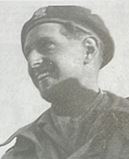Gordon Iles was born in Gloucestershire, the son of a well-known farming family. He joined the Royal Gloucestershire Hussars in 1940 and was commissioned in the Regiment in time to join us in Iraq at the end of 1942.

We have asked his last wartime Squadron Leader, now His Honour Judge Argyle MC QC, to write a memoir:
“By the Spring of 1945, the 7th Queen’s Own Hussars were a highly trained regiment equipped with Sherman DDs amphibious heavy tanks. Gordon Iles was a full Lieutenant, commanding a troop of four such tanks (five men in each). During the advance up the Adriatic Coast by the 8th Army in 1944, and during the following winter, when nine Cavalry regiments were made to pretend that they were Infantry in order to give the real PBI a rest, Gordon had proved himself as a leader of his men, as a skilled tank commander, able to cope with mechanical and routine administration matters, and basically as a man of the West Country who did not hesitate to lay his life on the line when the situation demanded it.
“In the Mess, large, easy-going, generous and a good friend, he was a popular man. If he disagreed with something, he would say so, loud and clear, especially to his squadron leader! Occasionally, he was right.
“Gordon and I had one great thing in common – – shooting. He was a tip-top shot; both he and I had brought our shotguns to the war, and in Egypt (ducks) and in India and Iraq (partridges). we were able to supplement the rations for ‘A’ Squadron Officers’ Mess Gordon a good deal more than me.
“When we came to the crossing of the River Po, the three sabre squadrons of the 7th were each asked to lead a brigade of infantry across the river. (‘A’ Squadron was on the right and so nearest the Adriatic Sea). The Po at this time of the year was in spring flood, swift flowing, very choppy and very wide. Just think of it, and pay a silent tribute to those tank drivers and hull gunners who sat in semi-darkness and, of course, underwater while the crossing was accomplished. Indeed ‘C’ Squadron nearly lost a driver from drowning in a tank that sank further along the river bank but for the bravery of Colonel (Fairy) Foote VC, who plunged in to save him.
“‘A’ Squadron’s task was to lead a brigade of the Queen’s Regiment over. Insofar as we could, we got to know them personally, and I particularly liked one of their Commanding Officers Nicholson whose firm’s gin product has always attracted me. One morning, about three days before we were due to cross, we crept in daylight up to the south bank, with our binoculars; a German sniper hit a subaltern of the Queen’s through the head, killing him instantly. Gordon lles was about 2 yards and I was about 3 yards away.
“Each Squadron was allotted a very senior officer to act as liaison with the high command. ‘A’ Squadron was lucky in that ours was the same Colonel Fairy Foote, a small man, exuding that indefinable quality called ‘leadership. He came to see me where I had my five HQ tanks leagued about 100 yards south of the river, “I would like you to go now, Argyle”, he said, I saluted, cancelled the arrangements I had made for a cup of hot tea for all ranks and 10 minutes later we were in the water on our way to Venice.
“‘A’ Squadron swam the Po on a two-troop front. I asked Gordon to lead with his troop on the left, and this he did brilliantly. The German soldiers facing Gordon and his supporting infantry chose (as usual) to die on the ground on which they stood before they lost it. I could hear the anger of the guns, the roar and rattle of mortars and small arms and automatics, I could see the blazing farms and houses as Gordon and his men relentlessly led the attack to the north. We won. The opposition was flattened but because of damage to their swimming equipment Gordon’s tanks were unable to swim a second river-the Adige and so he caught up with us at Mestre near Venice, about two days later, when the sappers had thrown bridges over both Po and Adige.
“Farewell for the moment, Gordon. We shall meet again soon!”
In recognition of his distinguished services in Italy, Gordon received a Mention in Despatches and was awarded the Bronze Star (USA).
After leaving the Regiment in 1947, by which time he had made Technical Adjutant and been promoted to Captain – Gordon returned to Gloucestershire, taking up employment with Agricultural Merchants in Southrop and marrying Daphne in 1950.
However, he returned to the Army in 1951, taking up a short-term commission with the 68th Training Regiment in Catterick and later serving in Germany. He retired again in 1955, returned to Fairford where he had lived for most of his life, and enjoyed all country sports, especially shooting.
Having lived many happy years of retirement in Fairford with Daphne and their son and daughter, Stephen and Sarah, and their grandchildren, Gordon died peacefully in Cirencester Hospital, aged 73, on 4 September 1993.
Following a private family funeral, a Memorial Service was held at St Mary’s Church, Fairford, before a full congregation of family mourners and friends.
The few of those left who served with Gordon are very much aware of his immense pride, over the remaining 45 years of his life, of having been “a 7th Hussar”.


